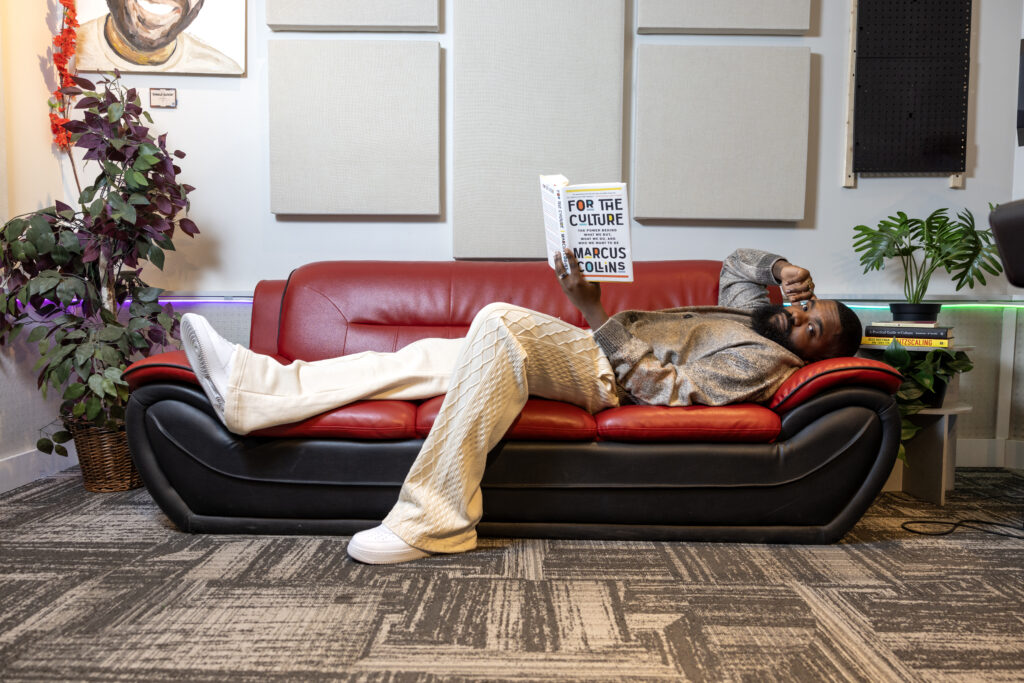
The Creative Force of Will Toms
By: Philip Roundtree
Before receiving recognition as Forbes ’30 under 30′ honoree in 2021 for his remarkable social impact, gaining prominence as Co-Founder and Chief Creative Officer of REC Philly, a multimillion-dollar creative hub, and serving as a board member of several nonprofits dedicated to humanitarian efforts, William Tyrone Toms was a precocious Black boy living in the Germantown section of Philly, Pa., using his inner strength and forced resilience to navigate familial trauma.
“[My] mother was battling drug addiction…; my father [was] incarcerated 30-60 years; my uncle was… sentenced to life; [another] uncle was murdered when he was 16 at the corner of our block,” Toms says, reflecting on family challenges. A young Toms leaned into the arts to cope with trauma’s effects, which was foundational for his future success. “Poetry was like the first outlet for me,” he says. “I just loved how I felt when I could express myself that way.”
When he wasn’t vulnerable through writing, the then-latch-key kid rushed home daily to watch tween and teen must-see television like BET’s 106 & Park. But not for reasons like seeing the latest fashion trends or admiring high-end vehicles. No, he watched intently, envisioning a life different from the outcomes associated with his origin story.
Toms described the media’s early impact: “[I visualized what it would look like] to actually build a life for myself, that was in the media field, in the creative field.” His outlook was validated when he first saw Rocafella Records artists State Property, a group of twenty-something Black males from inner-city Philadelphia whose appearance and life experiences mimicked his, yet who were building a successful brand and business while remaining authentically them.
Toms’s manifestation proved correct, but like those who center community contributions, he shied away from discussing personal triumphs, instead acknowledging pivotal people aiding his journey, most notably his grandmother and caregiver, Corine Toms.
Tears accumulated while reminiscing about his grandmother’s love, resilience, and sacrifices. “That’s my number one cheerleader,” he says. To help him achieve his potential, Corine Toms relocated them from Germantown to Bucks County. This new environment offered more opportunities and unique challenges, like experiencing overt microaggressions and stereotyping.
Despite the environmental shift, Toms was still in survival mode, a type of survival known to Black folk who find themselves in unfamiliar waters where the only options are to sink or swim. “It’s just like… I have to survive—100%,” Tom says. “I think a lot of us [Black folk]… we adapt, however we can.”
Toms’s authenticity helped him survive; therefore, when co-creating REC Philly, he knew it had to be a safe, inclusive space for creatives to express themselves freely, where people could remove the masks, especially Black creatives. “I think so few young black people ever experience spaces where [we] don’t have to dim [our] light, and I think we did a really good job at [creating a safe space],” he explains, highlighting the importance of representation and a supportive community for Black creatives.
Whether it’s creating an equitable environment for REC Philly members, providing 12 lavish studio spaces for visual and audio artists laced with the latest technology, providing educational workshops and seminars with industry leaders, or penning (Un)Common Sense– a 10-strategy self-help guide for entrepreneurs to turn their passion into profit, meeting the need of the people has always been at the forefront of Toms’s work.
As a young entrepreneur, Toms had an innate knack for fulfilling the needs of his peers, like flipping popular wristbands for profit or designing and selling t-shirts. He honed pivotal skills beneficial for success, most notably bringing people with different needs together.
As a self-described social butterfly, Toms developed his most significant relationship with REC co-founder Dave Stewart, whom he calls the yin to his yang. They met in high school and went into business together on various entrepreneurial ventures, from their clothing line Circus– apparel displaying animal likenesses, with political satirical commentary to organizing parties. Toms and Stewart were on to something, but Toms’s college experiences nearly prevented them from achieving success.

When asked to discuss his college experience, the cool, calm, and engaging Toms hesitated briefly. However, this wasn’t a result of shame or embarrassment for the now adult Toms, but a momentary remembrance of the youthful 10, 12, and 15-year-old poetic Toms who was vulnerable and transparent with people incapable of holding his story. Yet, without blinking, he shared his experiences, desiring for his story to encourage, inspire, and act as a cautionary tale.
For Toms, a prominent internship in college caused financial difficulties. He explains the situation and says he worked too many internship hours, owing approximately $4,000, with only ten days to acquire the money. Ultimately, he made the money using his superpowers– relentless hustle, connections, and an entrepreneurial spirit, even if the means were controversial. However, like too many Black men, Toms’s hustle led to legal troubles and a suspension from school, nearly derailing his dreams. Yet, this nightmarish experience provided a teachable moment, a lesson in self-love through critique and healing old wounds.
Toms had two life-changing epiphanies while engaged with the legal system. First, as a mentor, he recognized a contradiction between what he told Black boys and his lifestyle. “The week before, I was speaking to [incarcerated] juveniles, telling them they could change their lives… Literally, seven days later, I’m sitting in [lockup].”
Second, an equally impactful phone call with his grandmother revealed that he yearned for the love of his incarcerated father. “[It was] powerful to hear my grandmother’s voice on that phone,” he says. “I know what it meant to feel that love on that phone.” He lamented not making himself available for his father during his incarceration and vowed to behave differently. Toms and his father now speak regularly, continuing to build their relationship.
Toms’s experiences solidified his path; he knew he couldn’t squander his gift. Newly liberated from legal constraints and the weight of historical trauma, which he accredits to attending therapy, he hit the ground running. Immersed in the entrepreneurial journey, he forewent completing school as he succeeded as a party promoter with Dave and then as a content creator for box-office films and music elites.
Like his grandmother, he envisioned more. “[I had this] epiphany… I can either continue to make millionaires more millions, or I can teach these same strategies to my homies, and they [earn] doing what they love.”
Toms desired a space rooted in love, where creatives felt valued and could learn and grow together without gatekeeping. On love, his definition is shaped by his grandmother’s selflessness. “I [see] love as the actions that empower the people you care about to reach their highest.” Toms’s love ethos resulted in his most notable offering– REC Philly, whose first seeds were sowed by his grandmother in the backyard of their Bucks County home.
Remembering the space, he states, “She [built] this gazebo in the backyard. It [was] really just a space for us to be ourselves and have the conversations we wanted to have, do the things we wanted… …it was very love-driven.”
“Love-driven” is an apropos term to describe the modus operandi of REC-Philly, whose concept was refined in January 2015 within a dilapidated warehouse in North Philly. “Raindrops Keep Fallin’ On My Head” wasn’t just a song created for the 1969 film Butch Cassidy and the Sundance Kid, but the actual warehouse conditions when the skies opened up on Toms and his friends, who lived in the space for 2+ years.
Yet, in true Will Toms fashion, his environment didn’t dictate his trajectory; his hustle did. Thus, the warehouse became an all-around media hub for shooting music videos and short film creation over the next several years. During this time, he and his peers flushed out the formal idea for REC Philly, including formalizing membership with 1,000+ members.
Being a forward-thinking executive, Toms knew that the company had outgrown its dilapidated warehouse and needed to relocate. Using YouTube as the educational resource and REC’s love for creatives as the catalyst, he learned how to raise enough capital to relocate from the warehouse into an innovative space in Philly’s Fashion District.
Relocating and designing the REC-Philly space are among Toms’s monumental moments; another includes hiring full-time employees who share his vision. In speaking with REC employees about his leadership, Project Manager Shawn MacMillian and Marketing Manager Diamond Durant used inspiration, passion, wisdom, vision, and commitment to describe his impact on their journeys.
Another proud moment was being named a 2021 Forbes’ 30 under 30′ honoree for Social Impact, which he likened to a musician winning a Grammy. However, the moment that Toms called his grandmother to tell her, “WE did it,” was the real validation for him, a significant milestone given their journey together.
REC is expanding on its mission to empower creatives globally, building on the foundation laid by Will Toms and his grandmother, Corine.
